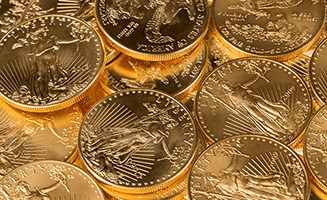


Jp Cortez | Special to the Idaho Freedom Foundation
Protecting yourself against foreseeable harm is prudent. Wearing a seatbelt or stretching before strenuous activity are wise decisions. Policies that disincentivize protective measures against obvious risks should be removed.
For example, if governments enacted a tax on seatbelt use, you might be less likely to buckle up.
Another example of protection against obvious risk is exchanging ever-devaluing Federal Reserve Notes for something that is a better store of value, such as physical gold and silver.
The Federal Reserve System makes no effort to hide that its goal is to inflate away your dollars year over year, decreasing the value of each individual dollar in your wallet as time goes on.
Erecting barriers to owning and holding gold and silver strips people of their abilities to adequately protect themselves against foreseeable risk. Assessing income taxes is one of the many ways in which government penalizes forward-thinkers who try to protect themselves and their families.
Idaho is no exception to this form of pillaging.
If you own gold to protect against the devaluation of America’s paper currency, you may end up with a “gain” when priced in Federal Reserve Notes (commonly referred to as the dollar). But it’s not a real gain. It’s really just a phantom “gain” that results from the inflation created by the Federal Reserve. But the IRS and the Idaho Department of Revenue and Taxation will assess a tax on your nominal gain anyway.
The Federal Reserve seeks deliberately to create consumer price inflation at a target inflation rate of 2 percent or higher per year. And the Fed has succeeded in this disturbing goal, to the great detriment of savers, pensioners, and wage-earners. In fact, since the United States severed the currency’s last formal link to gold 47 years ago, the purchasing power of the Federal Reserve Note has fallen more than 90 percent.
It’s these policies and this inflation that lead to taxable “gains” that precious metals holders experience.
Fortunately, House Majority Leader Mike Moyle, R-Star, and Senate Assistant Majority Leader Steve Vick, R-Dalton Gardens, are doing something about this problem by reintroducing a sound money bill that passed 56-13 in the State House last year. If HB 449 is signed into law by Gov. Butch Otter, would remove Idaho income taxation of precious metals.
Exempting precious metals from state income taxes is a step Idaho should take to promote the adoption and use of constitutional money. While the existing sales tax exemption means that precious metals are not subjected to “double taxation” by Idaho, nominal “gains” in precious metals vis a vis the Federal Reserve Note are still subject to state income tax.
At the federal level, nominal gains on precious metals are already taxed as capital gains – and at the discriminatorily high 28 percent long-term capital gains tax rate. (Capital gains on other assets are taxed at 15 percent or 20 percent, depending on your income level). And your “gain” from owning our constitutional money currently increases your taxable income at the state level too.
Gold and silver, per Article 1 Section 10 of the U.S. Constitution, are deemed legal tender, i.e. money, and states are directed to treat them as such. To levy taxes against the only form of money mentioned in the U.S. Constitution is wrong, but also stymies the efforts of Americans trying to protect themselves against the devastating effects of intentional inflation by the Federal Reserve.
Taxing the exchange of the monetary metals for Federal Reserve Notes is like taxing the exchange of a dollar bill for four quarters.
By passing HB 449 and removing state taxes from precious metals coins, bars, and rounds, Idaho can reaffirm the U.S. Constitution and join the sound money movement sweeping the nation.
Every day we see the American people open their minds to the historic role that sound money has played. Several state legislatures, including Arizona, Louisiana, Wyoming, and Alabama, have recognized the danger of being totally reliant on a monetary system based on debt and unbacked fiat money, and they’re taking concrete steps to liberalize the laws surrounding gold and silver ownership.
As more states reduce the costs and barriers to precious metals ownership, those who diversify some of their savings into the safety of gold and silver will continue to grow, and the concept of sound money will become widely embraced once again.
House Bill 449 should again pass the Idaho House easily. That’s why all eyes are on the Idaho Senate where the measure is expected to be heard in Senator Dan Johnson’s Local Government and Taxation Committee.
Supporters of sound money should contact their senators immediately and urge support for House Bill 449. Gold and silver are honest money, and Idaho should stop taxing it.
# # #
Jp Cortez is assistant director of the Sound Money Defense League, an Idaho-based public policy group working nationally to bring back gold and silver as America’s constitutional money.


